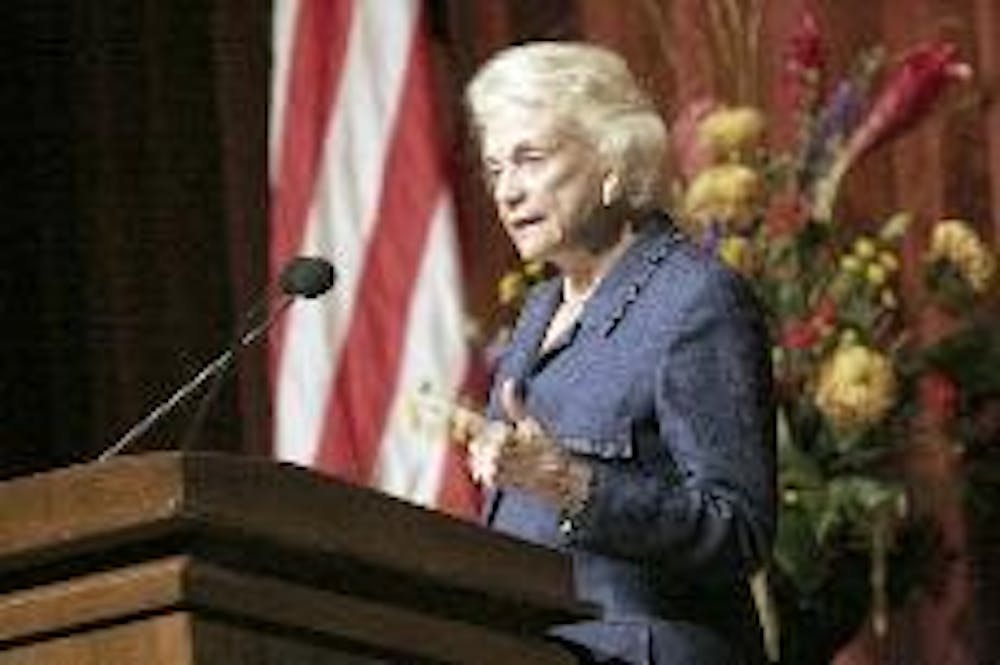
O'Connor jokes with audience members Tuesday evening in Millett Hall that by retiring from the court, the number of female justices was cut by 50 percent. (Michael Pickering)
Charles Miller, former editor in chief of The New York Times, wrote controversial editorials and was considered a magnificent writer by many. He was also against women's suffrage. Now Gail Collins, a graduate of Cincinnati's Seton Hall High School, is the first woman to have his job.
"It's a great feeling to sit in that boardroom and look up to see his picture staring down from the wall and knowing that I am a woman in that position," said Collins, current editorial page editor of The New York Times.
In her speech titled "Opinion-Making in an Age of Contention," at Miami University Tuesday, Collins talked about the division between opinion and news, changes in the media due to technology, how to find passion in a job and the war in Iraq.
"The New York Times has always been very traditional but when you guys take over the world in a few years, it will all be different," Collins said. "Changes in technology will make reading and reporting very different. I'll probably be a senile bystander at that point."
She admitted that no one can figure out how to make everything free and available on the Internet while still running a business, and she worries that the editorial forum will be lost in the upcoming generation.
"The free press has never been free," Collins said. "Everyone has to find a way to make at least enough money to pay for what they do. These people throw their bodies in front of journalism everyday. People don't understand how hard it is to keep a quality paper going, to pay those reporters, to send people all over the world."
Collins began writing for The Times in 1995 as a member of the editorial board and became a columnist in 1999. One month before the September 11 attacks, she became the first woman ever in charge of the editorial pages.
"The generation of women before me fought and often had careers ruined to open this world to us," Collins said. "I came in at the moment when the media was out looking for women to hire. I am just the beneficiary."
Collins held The Times in high regard for its traditionally sound reporting, judgmentand objectivity.
"There is a complete wall between the news side and the opinion side. We're often both shocked and horrified at what the other does on a certain day," Collins joked. "The news side tries the best it humanly can to present objective reporting. Our editorials just have to be accurate, not balanced."
Enjoy what you're reading?
Signup for our newsletter
While agreeing with the general opinion that The Times tends to be more liberal, Collins said when picking Op-Eds, they try and pick the ones that disagree with theeditorial pieces.
"The war in Iraq is an issue that has driven our columnists into one position so they're kind of clumped together right now," Collins said. "This is an issue where I wish we had no consensus. We always believed there were weapons of mass destruction but were against the invasion."
This past election was one of the first in which The New York Times did not endorse a Republican for Congress.
"We don't want to be seen as a mouthpiece for the Democrats," Collins said. "We just thought it was so important this year that the control of the House shift over and let the Republican majority take some time out. There's a great tradition in America that if one side hasn't been doing well, we'll switch it out."
Collins has earned national praise for her ability to manage the editorial pages during a time of change and controversy. The section has grown to three pages on Sundays, launched an online section and developed smaller editorial pages for five regional weekend opinion sections.
"People don't like to read things that challenge their beliefs," Collins said. "People really love to read things that reaffirm what they believe at the beginning of the day. Most New York subscribers would love it if we started everyday with a bash on President Bush but we're not going to do that."
Patti Newberry, journalism professor and lecturer, said her editorial writing class has been following The New York Times during the past few weeks.
"(The New York Times has) been under intense scrutiny for their view on Bush and the war on terror, but they still show the utmost integrity and highest quality," Newberry said. "We couldn't be any prouder that she's here sharing that with the journalists of tomorrow."
Collins will be ending her five-year tenure as editorial page editor in January 2007 for a six-month leave of absence to work on her new book about American women since 1960, but will return as a columnist in July.
"The only reason I know of to go into journalism is if you find something that really calls to your heart and gives you a passion that no matter what happens, even if you never get that job at The New York Times, it's still a reward for you," Collins said. "If you can find your voice and write about things close to your heart, it's the best job in the world."




